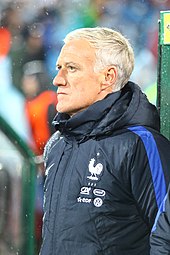Didier Deschamps
He played as a defensive midfielder for several clubs, in France, Italy, England and Spain, namely Marseille, Juventus, Chelsea and Valencia, as well as Nantes and Bordeaux.
Nicknamed "the water-carrier" (French: le porteur d'eau), Deschamps was an intelligent and hard-working defensive midfielder who excelled at winning back possession and subsequently starting attacking plays, and also stood out for his leadership throughout his career.
After his spell with Juventus, Deschamps spent a season in England with Chelsea, winning the FA Cup, and scoring once against Hertha BSC in the Champions League.
[9] He finished his playing career in Spain, spending a season with Valencia, helping them to the 2001 UEFA Champions League final, but he remained on the bench as they lost to Bayern Munich.
In 1998, Deschamps captained France as they won the 1998 World Cup on home soil in Paris, holding an integral role in the team.
Following the tournament, Deschamps announced his retirement from international football, making his second last appearance in a ceremonial match against a FIFA XI in August 2000, which resulted in 5–1 victory.
At the time of his retirement Deschamps held the record for the most appearances for France, though this has since been surpassed by Hugo Lloris, Zinedine Zidane, Lilian Thuram, Marcel Desailly, Olivier Giroud, Antoine Griezmann, Patrick Viera and Thierry Henry.
In his position, Deschamps primarily excelled at impeding the opposition's attacking movements as a defensive midfielder, and so was capable of starting up attacking plays and distributing the ball to teammates once he won back possession, leading to him being derisively nicknamed "the water-carrier" by former France teammate Eric Cantona, who implied that Deschamps's primary contribution to the national team was to retrieve the ball and pass it forward to "more talented" players.
[10][11][12] Deschamps's ability to perform this role was made possible due to his high work-rate, tenacity, stamina, vision, reliable distribution and technique, and his efficacy at pressing and tackling opponents.
[15] On 10 July 2006, Deschamps was named head coach of Juventus, after Fabio Capello resigned in the wake of the Calciopoli scandal.
[20] His success had seen the Marseille manager linked to a return to Juventus,, whose former president Giovanni Cobolli Gigli urged the club to bring back Deschamps to replace Ciro Ferrara.
[22][23][24][25] On 14 April 2012, Marseille won the Coupe de la Ligue for third time in a row after they beat Lyon 1–0 with Brandão scoring in extra-time.
[26][27][28] Deschamps was delighted with Marseille's Coupe de la Ligue triumph and added: "All title wins are beautiful, as they are difficult to achieve.
"[29][30][31] On 2 July 2012, Deschamps left the club by mutual agreement, citing their poor finish of tenth place in 2011–12.
[40] France finished second in the group, three points behind Spain, and thus had to win the two-legged play-off tie against Ukraine to advance to the final phase of the tournament.
At the 2014 FIFA World Cup in Brazil, Deschamps's team advanced to the quarter-finals where they lost 1–0 to eventual champions Germany,[43] and Paul Pogba was named Best Young Player of the tournament.
[45] At Euro 2016, Deschamps led France to the final on 7 July after a brace from Antoine Griezmann helped defeat Germany 2–0.
[50][51] Although initially criticized for conservative tactics as the national team had indifferent showings to advance from the group stage with narrow wins over Australia and Peru and a draw against Denmark,[52] they put in dominant performances during the knockout rounds, defeating Argentina 4–3 in the round of 16,[53] and Uruguay 2–0 in the quarter-finals to reach the semi-finals.
[61] France secured their place in UEFA Euro 2024 by finishing at the top of their qualifying group, achieving seven wins and one draw.
[65] Deschamps first made a name for himself with Monaco as one of the best tacticians in Europe during the team's 2003–04 Champions League run, with his counter-attacking style.
He also brings understanding and pragmatism, common sense and adaptability; the same qualities that served him so well as a player in midfields with more glamorous talents.
In this system, helped provide balance to the team by covering the left flank defensively, thus limiting the attacking threat of the opposing full-backs.
[68][69][70] Deschamps also used centre-forward Olivier Giroud as a false-9 who used his physicality to create space and chances for forwards Antoine Griezmann and Mbappé, giving them the freedom to generate opportunities and score, in a similar manner to Stéphane Guivarc'h, who was Deschamps's teammate in the victorious French 1998 World Cup side.
[71][72][73][74] However, his pragmatic and defensive style drew criticism from several Belgian players following France's semi-final victory in the tournament.


